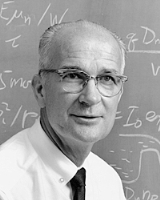
William Shockley
Overview
William Bradford Shockley Jr. (February 13, 1910 – August 12, 1989) was an American
physicist
and inventor. Along with John Bardeen
and Walter Houser Brattain
, Shockley co-invented the transistor
, for which all three were awarded the 1956 Nobel Prize
in Physics.
Shockley's attempts to commercialize a new transistor design in the 1950s and 1960s led to California's "Silicon Valley
" becoming a hotbed of electronics innovation. In his later life, Shockley was a professor at Stanford
and became a staunch advocate of eugenics
.
Shockley was born in London
, England
to American parents, and raised in his family's hometown of Palo Alto, California.
United States
The United States of America is a federal constitutional republic comprising fifty states and a federal district...
physicist
Physicist
A physicist is a scientist who studies or practices physics. Physicists study a wide range of physical phenomena in many branches of physics spanning all length scales: from sub-atomic particles of which all ordinary matter is made to the behavior of the material Universe as a whole...
and inventor. Along with John Bardeen
John Bardeen
John Bardeen was an American physicist and electrical engineer, the only person to have won the Nobel Prize in Physics twice: first in 1956 with William Shockley and Walter Brattain for the invention of the transistor; and again in 1972 with Leon Neil Cooper and John Robert Schrieffer for a...
and Walter Houser Brattain
Walter Houser Brattain
Walter Houser Brattain was an American physicist at Bell Labs who, along with John Bardeen and William Shockley, invented the transistor. They shared the 1956 Nobel Prize in Physics for their invention. He devoted much of his life to research on surface states.- Early life and education :He was...
, Shockley co-invented the transistor
Transistor
A transistor is a semiconductor device used to amplify and switch electronic signals and power. It is composed of a semiconductor material with at least three terminals for connection to an external circuit. A voltage or current applied to one pair of the transistor's terminals changes the current...
, for which all three were awarded the 1956 Nobel Prize
Nobel Prize
The Nobel Prizes are annual international awards bestowed by Scandinavian committees in recognition of cultural and scientific advances. The will of the Swedish chemist Alfred Nobel, the inventor of dynamite, established the prizes in 1895...
in Physics.
Shockley's attempts to commercialize a new transistor design in the 1950s and 1960s led to California's "Silicon Valley
Silicon Valley
Silicon Valley is a term which refers to the southern part of the San Francisco Bay Area in Northern California in the United States. The region is home to many of the world's largest technology corporations...
" becoming a hotbed of electronics innovation. In his later life, Shockley was a professor at Stanford
Stanford University
The Leland Stanford Junior University, commonly referred to as Stanford University or Stanford, is a private research university on an campus located near Palo Alto, California. It is situated in the northwestern Santa Clara Valley on the San Francisco Peninsula, approximately northwest of San...
and became a staunch advocate of eugenics
Eugenics
Eugenics is the "applied science or the bio-social movement which advocates the use of practices aimed at improving the genetic composition of a population", usually referring to human populations. The origins of the concept of eugenics began with certain interpretations of Mendelian inheritance,...
.
Shockley was born in London
London
London is the capital city of :England and the :United Kingdom, the largest metropolitan area in the United Kingdom, and the largest urban zone in the European Union by most measures. Located on the River Thames, London has been a major settlement for two millennia, its history going back to its...
, England
England
England is a country that is part of the United Kingdom. It shares land borders with Scotland to the north and Wales to the west; the Irish Sea is to the north west, the Celtic Sea to the south west, with the North Sea to the east and the English Channel to the south separating it from continental...
to American parents, and raised in his family's hometown of Palo Alto, California.
Quotations
I am overwhelmed by an irresistible temptation to do my climb by moonlight and unroped. This is contrary to all my rock climbing teaching & does not mean poor training, but only a strong-headedness.![]()
Memo to himself in 1947, regarding work on the transistor, as quoted in Broken Genius : The Rise and Fall of William Shockley, Creator of the Electronic Age (2006) by Joel N. Shurkin, Ch. 7, p. 125
If you take a bale of hay and tie it to the tail of a mule and then strike a match and set the bale of hay on fire, and if you then compare the energy expended shortly thereafter by the mule with the energy expended by yourself in the striking of the match, you will understand the concept of amplification.![]()
As quoted in The Chip War : The Battle for the World of Tomorrow (1989) by Fred Warshofsky, p. 21

